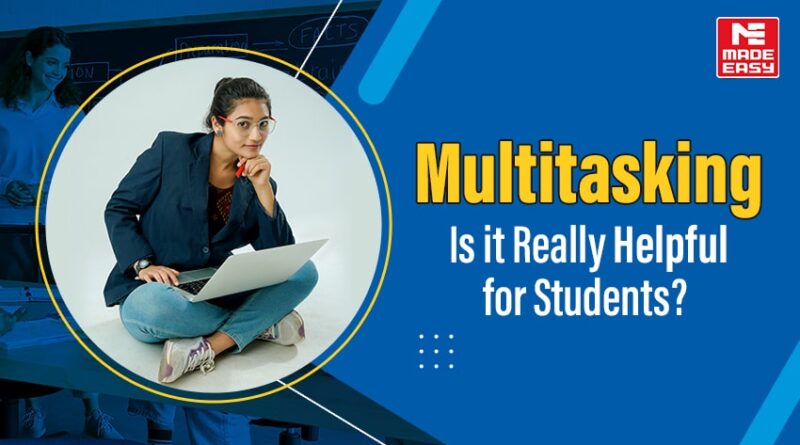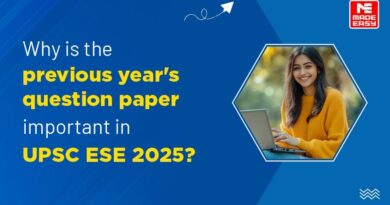Multitasking: Is it Really Helpful for Students?
We have all heard about multitasking, but is it useful enough for students? We’ve all faced situations where we have a lot of work to complete but can only focus on one task at a time. This process actually takes up a lot of time, often leaving you unable to complete all your tasks. Well, one solution to this problem is multitasking. Now, we know if multitasking is really beneficial and if it can be useful in student life.
Most of the times people tell you to avoid multitasking because you cannot concentrate on a particular task and your efficiency decreases. Well, this cannot be completely denied; therefore, it is important that you choose wisely the tasks you want to do with multitasking. Studying two subjects at the same time can become a bad example of multitasking, but reading newspaper while having breakfast or lunch can be a good way of multitasking that can help you read newspaper while completing your daily tasks.
Multitasking is performing two or more tasks simultaneously. What needs to be kept in mind is that while multitasking, we should not compromise on the quality of any of the tasks as that will dilute the whole sense behind multitasking. While preparing for any competitive examination like GATE or ESE, covering a vast syllabus with utmost precision and accuracy is a heavy task to perform.
To stay motivated and continue making progress, it’s essential to take proper rest and breaks while preparing for any exam. Often, these breaks can lead to feelings of guilt about wasting time, making it difficult to prioritize self-care. In such situations, multitasking skills can be a great way to take a break without completely sacrificing your studies.
Before exploring the various multitasking techniques students use today and understanding the importance of multitasking, it’s essential to discuss some key points students should keep in mind while multitasking.
Table of Contents
Tips on Multitasking:
1. Do not multitask huge activities:
Multitasking Is a great way of doing more work in lesser time always remember that multitasking two heavy tasks, like two subjects at the same time can actually be a disaster.You might struggle to focus on any task and end up wasting the time you had. Therefore, pick up two tasks one of which is lighter than the other like walking and listening, eating and reading.
2. Always make sure what you want to do:
Before you begin your task, be clear of your target, what is the work at hand and how do you plan on approaching it. Not having a good plan in action can actually hamper both of your tasks. If you plan on multitasking by revising your notes during lunch, make sure you’ve decided in advance which subject you want to review and which topics you aim to complete. So that you do not end up wasting more time in finding the topic to be read.
3. Inline both the task with each other:
If you plan on multitasking by listening to a video while going for a walk, make sure the video isn’t too long and aligns with the time you’ve set for your walk. If the video is too lengthy, you may not finish it that day and might postpone it indefinitely. So, align both tasks well when multitasking, as doing either halfway will bring little benefit.
4. Keep the tasks handy:
Whenever multitasking, make sure that you are not doing activities that require a large number of books, pencils, calculators. For multitasking skills, things should be handy so that you do not waste time in organizing things and then actually starting the tasks. For example, if you are going to a café for a break and you want to revise some formulae or a topic, do not carry your books along. Make sure that whatever you have to revise is in the form of notes, either on your phone or some loose sheets. This will actually encourage you to do the work. Carrying heavy books will be a task in itself and you will end up not doing anything at all.
5. Work on the related tasks together:
Picking up two subject books together is not multitasking but a wastage of time. Whereas practicing the questions of a particular topic along with revising your notes is an effective way to study. Therefore it is necessary that while multitasking you pick up related tasks together and not just randomly start any task at hand. Working on the related tasks simultaneously will make your work more efficient as you will be able to be more productive.
While the above points must be kept in mind while multitasking, it is also important that one practices it for a long time to become perfect at it. When not practiced properly or if the tips are not taken care of, some of the students instead of deriving benefits from it end up wasting their time and reducing their productivity by not being able to concentrate on a single task. Therefore make sure you multitask your work efficiently and derive maximum benefits from it.
Now that we’ve discussed what to keep in mind while multitasking, let’s explore why multitasking skills are essential and the advantages they offer:
Advantages of Multitasking
1. Saves time:
When you need to complete two tasks simultaneously, using multitasking skills can be more efficient than dedicating separate time to each. This approach saves you valuable time, allowing you to either improve your current task or work on other pending tasks. Thus multitasking helps you save time and make you become more efficient with time. During your exam preparation, you plan of dedicating one hour to listen to an NPTEL video of your branch every day to understand the subject better, if you listen to this video while having lunch or taking a walk, you save yourself one hour daily in which you can complete another topic that was due at your end.
2. Increases productivity:
Multitasking skills increase your efficiency as simultaneously working will help train your brain to work more effectively and any work that you do during studies or later at work, your productivity will increase. Revising your notes during lunch or reading the newspaper during breakfast trains your brain to work in a particular fashion.
Once you have practiced this technique for a long time. Every time you sit for lunch or breakfast your mind will work in a similar fashion and you will start looking for something to read. This always helps you in increasing your productivity by simultaneously working your brain in two places.
3. Reduces procrastination:
Procrastination is delaying the work at hand. Well, when multitasking you save yourself time and increase your productivity which actually encourages and motivates you to complete the work at hand as and when possible reducing procrastination. As exams approach, especially for GATE and ESE, students often become so absorbed in revising their notes that they delay solving previous years’ papers or participating in test series.
In such a situation one can actually pick up a subject and their questions simultaneously. Keep solving the questions and as and when the topic comes up revise the topic as well. This way you will understand what type of questions can be asked and also you will not delay the question-solving session.
While multitasking skills have their share of advantages, many students will be confused about how they can use multitasking during their preparation. Well, we have provided you the effective ways in which multitasking skills can be used by students:
During the GATE or ESE preparation, the students have to juggle between a lot of work and studies and if you are a working professional then it becomes really difficult to tackle both work and study pressure. In these cases, multitasking is the new-age 21st-century skill that helps you manage it all and score well in the exams.
A. Break and intervals:
During exam time, students often limit their physical movement to the bare minimum and skip breaks, becoming overly engrossed in their studies. It is always advisable to take proper breaks to enhance learning efficiency; however, how you utilize these breaks is equally important.
B. Walk in the park:
Whenever you have time, make sure to go for a walk or run in the morning or evening. This will not only refresh your mind but also provide a much-needed break, significantly reducing the pressure of exam preparation. If you believe that walking is a waste of your study time, you might be mistaken. Nowadays, there are many videos available online that can help you understand specific topics in detail. You can elevate your exam preparation by watching these educational videos.
Also, you have toppers talk videos and TED videos which will inspire you to work harder and work dedicatedly towards your goal. So while walking instead of playing any random song you can actually listen to these videos and do multitask utilizing your time for your studies.
C. Cafe or Restaurant:
One can also go to a café or a good restaurant once a blue moon to freshen up their mood and come out of the monotonous environment of their rooms or libraries. The cafes are a good place to sip in a coffee or tea and read something. So you can take your notes or any inspirational novel to cafes and restaurants whenever you need a break. You can also go with a fellow friend with whom you can discuss your studies and also have a much-needed break.
D. Study Break:
It is not necessary that multitasking skills would only be restricted to doing two things simultaneously. You can multitask in a different way as well. If someday you are bored or tired or reading the technical part of the syllabus you can always switch between the technical and non-technical parts.
This will help your mind work faster and you will experience less fatigue. During the preparation of the aptitude part, one can also listen to songs and solve questions, the condition being that the song only adds a good ambiance to your room and does not disturb you from your studies.
E. Working Professionals:
For all the students who are working professionals, they find it really hard to take out time during their busy schedule. Well for them multitasking skills is an option that comes in very handy. They can actually utilize the time spent traveling, breaks to study. Every day before you leave for work set a target for yourself of what you will complete that day during office hours and utilize any free time efficiently.
F. Traveling:
While traveling one can always have some notes: whether hardcopy or soft copy. Also one can read the newspaper during the time they are traveling. Whenever you are reading something make sure that instead of underlining in the book you also make separate notes of the important facts. This will not only help you in revising but also be very handy to read while traveling.
G. Office Hours:
In the office, there are many times when you do not have much work to do but still you can leave the office during working hours. In such cases instead of gossiping around one can actually take the help of the internet and complete any topic that is on your agenda for the day and you need to complete it immediately.
Having a pre-planned target for work will help you in being more efficient in what you study as you will not go haywire and focus on the concerned topics. Initially one may find this difficult but once you get accustomed to it, multitasking will make your life easier.
H. Eating:
While preparing for the GATE or ESE or other competitive exams, many students skip lunch to continue studying, which is a detrimental practice that can negatively impact their health. Instead, consider multitasking during meals. For example, when sitting down for breakfast, you can start your day with the newspaper, enjoying both your food and the news. Similarly, during lunch, you can read short notes, allowing you to complete your meal while continuing your studies.
Additionally, during lunch and dinner breaks, you can always pick a topic you’ve already studied and revise it. Regularly revisiting topics will help reinforce your memory, ensuring you don’t feel like you’re wasting time.
Thus, these are ways the multitasking technique can enhance your efficiency and break the monotony of the study schedule typically followed when preparing for any examination.
Understanding the right techniques and applying the tips mentioned for multitasking is essential for effective usage. In this digital age, multitasking is a vital 21st-century skill that helps you keep pace with the fast-moving world. While multitasking can present its challenges, practicing it with care can yield significant benefits.
FAQs:
Q.1. Why is multitasking important for students?
Answer: Multitasking is important for students because it helps them efficiently manage various responsibilities, such as balancing curriculum, extracurricular activities, and personal commitments. It can enhance time management skills and adaptability during exam preparation, helping students prepare for real-world challenges where multitasking is often necessary.
Q.2. What is multitasking as a student examples?
Answer: Examples of multitasking for students may include preparing for an exam while listening to educational podcasts, completing exam assignments while participating in group discussions, or managing a part-time job alongside academic responsibilities. These activities demonstrate the ability to focus on multiple tasks at once, which improves productivity.
Q.3. What are 3 benefits of multitasking?
Answer: Three benefits of multitasking may include better time management, improved adaptability to changing circumstances, and the ability to process information from different sources simultaneously. These skills are important for academic success and can be beneficial in professional environments.
Q.4. How much time does multitasking save you?
Answer: The time saved by multitasking can vary widely depending on the tasks involved and personal proficiency. On average, multitasking can reduce the total time spent on tasks by enabling simultaneous progress on multiple fronts, although this may lead to less benefit if the tasks require full attention.
Q.5. Is multitasking more productive?
Answer: Multitasking can be productive for simple, repetitive tasks that don’t require intense concentration. However, for complex tasks, focusing on one task at a time produces better results, as this reduces errors and increases efficiency.
We hope this article enhances your preparation for GATE, ESE, SSC JE, RRB JE, and other engineering exams, helping you become more organized and systematic. We would love to hear your thoughts on multitasking, so feel free to share your views with us in the comment box. Wishing you all the very best!
Dear Aspirants,
Your preparation for GATE, ESE, PSUs, and AE/JE is now smarter than ever — thanks to the MADE EASY YouTube channel.
This is not just a channel, but a complete strategy for success, where you get toppers strategies, PYQ–GTQ discussions, current affairs updates, and important job-related information, all delivered by the country’s best teachers and industry experts.
If you also want to stay one step ahead in the race to success, subscribe to MADE EASY on YouTube and stay connected with us on social media.
MADE EASY — where preparation happens with confidence.

MADE EASY is a well-organized institute, complete in all aspects, and provides quality guidance for both written and personality tests. MADE EASY has produced top-ranked students in ESE, GATE, and various public sector exams. The publishing team regularly writes exam-related blogs based on conversations with the faculty, helping students prepare effectively for their exams.





Plz make a imp blog how a 5th sem student manage time for clearing ESE in his first attempt .How to manage time of college and Ese preparation.If someone’s study from scratch..
Dear Candidate,
Thanks for your valuable suggestion. We will surely work upon this. Keep visiting our blog for helpful and insightful content.
Regards,
Team MADE EASY
I often study 2 subjects (physics and chemistry) at the same time is it ok
Dear Candidate,
Thanks for writing to us. Studying multiple subjects is not a problem until you are able to keep your focus to one subject while you are at it.
Regards,
Team MADE EASY